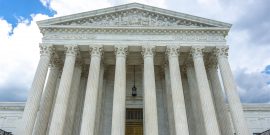The Establishment Clause, unlike the other First Amendment provisions, is not based on freestanding personal freedoms.
Defending Religion as a Public Good
The Supreme Court’s ruling in American Legion v. American Humanists Association prevented a wrong, but missed an opportunity to do some good.
The high court was right to thwart the aggressive iconoclasm of the Humanists, who sought to have the Bladensburg Memorial Cross removed, demolished, or maimed, claiming that its presence on public property violated the Establishment Clause of the Constitution. Yet the justices should also have probed more deeply and reconsidered a flawed understanding of the Establishment Clause that has distorted our thinking about the role of religion in politics for decades.
Writing for the majority, Justice Alito argued persuasively that the cross need not be understood as having a religious purpose. It is, he said, primarily a reminder of the overseas graves of American soldiers who perished in the First World War, and hence of the sacrifices they made for their country. And this, he concluded, is a sufficiently secular purpose for the cross to be upheld under the Establishment Clause.
Fair enough. But it is not really clear that the Establishment Clause either requires every public act to have a secular purpose or prohibits any public act that has a religious purpose.
The text forbids any “law respecting an establishment of religion.” But a governmental action—especially, as Justice Thomas noted in his concurrence, a non-coercive one—might promote religion without going so far as to establish a religion or to respect an establishment of religion.
This was a key point of then-Justice William Rehnquist’s dissent in Wallace v. Jaffree, a 1985 school prayer case. As Rehnquist noted, the Founders—the generation of men who wrote and ratified the First Amendment—supported a number of public acts of a religious character. The First Congress—the same Congress that drafted the language of the Establishment Clause—called upon President George Washington to “recommend to the people of the United States a day of public thanksgiving and prayer, to be observed by acknowledging with grateful hearts the many and signal favors of almighty God.” Washington complied, issuing a proclamation recommending Thursday, November 26th, 1789, as a day “to be devoted by the people of these States to the service of that great and glorious Being who is the beneficent author of all the good that was, that is, or that will be.” Similar proclamations were made by Presidents John Adams and James Madison. Moreover, as Rehnquist pointed out, the First Congress re-enacted the Northwest Ordinance of 1787, which held that “[r]eligion, morality, and knowledge, being necessary to good government and the happiness of mankind, schools and the means of education shall forever be encouraged.” The Supreme Court would do well to review Rehnquist’s 1985 dissent, as well as the whole body of subsequent scholarship that calls into question the idea that the Establishment Clause strictly forbids the government to do anything with a religious purpose.
In addition, the Court’s insistence on asking whether an act of the government has a secular or a religious purpose overlooks the very real possibility that it might have both. We can learn this from one of the greatest commentators on American politics, Alexis de Tocqueville, author of Democracy in America.
Tocqueville closely considered the role of religion in American politics. On the one hand, he made clear that, for the purposes of his book, he was not particularly interested in the theological truth or falsity of any particular religious beliefs. On the other hand, he also held that religion “should be considered the first” of America’s “political institutions” and even that America should seek to “maintain Christianity . . . at all cost.”
This paradox is explained by Tocqueville’s belief that religion—whatever it may do for the individual soul in the hereafter—serves the political interests of democracy in the here and now. Religion, Tocqueville believed, is a necessary foundation for public justice. Without it, without a sense of God existing above the people and judging them, the people might conclude that they are free to do anything they please, with the result that democracy would degenerate into majority tyranny.
Majority tyranny, however, was not the only grave threat to freedom that Tocqueville discerned in modern democracy. There is also the danger that the people might willingly submit themselves to a despotic government. And, he contended, they are more likely to do so if they have lost their religious convictions. In the absence of religion, Tocqueville contended, human beings will be tormented by doubt about the most important questions, such as their duties to each other and to the community. “They are worried and worn out by the constant restlessness of everything,” and there is therefore a danger that, in their desire to find some stability and certainty, they will “hand themselves over to a master.”
Moreover, Tocqueville held, only religion can elevate the souls of democratic citizens above the vulgar materialism that is fostered by democratic prosperity—a greed for physical comforts that threatens freedom by distracting citizens from political participation. On Tocqueville’s view, then, a public spirited statesman might well act to promote religion for secular reasons.
This same way of thinking informs George Washington’s celebrated “Farewell Address.” Here, the father of our country instructed his fellow Americans that “religious principle” is a necessary foundation of “national morality,” and that religion and morality are together the “indispensable supports” of the “dispositions and habits that lead to political prosperity.” Accordingly, he concluded, the “mere politician, equally with the pious man, ought to respect and to cherish them.”
From Tocqueville and Washington’s teaching, it follows that a public policy could have both a religious and a secular purpose. A responsible political leader might act to promote religion for secular reasons, on the understanding that religion is necessary to a healthy democracy. Our country, and its Supreme Court, should reconsider this venerable, reasonable, and perfectly constitutional understanding of religion’s role in our public life.

